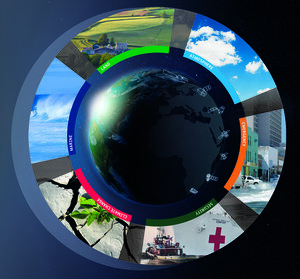Copernicus benefitting society and the environment
The financial benefits of the Copernicus programme, as well as opportunities for sustainable economic growth and job creation in Europe, came into focus recently in Athens, Greece.
Europe’s Copernicus programme uses accurate and timely data from satellites and other sources to provide key information services to improve the way the environment is managed, help mitigate the effects of climate change, enable the creation of new applications and services for citizens and businesses, and safeguard everyday lives.
While improving daily life, this ambitious programme is also expected to generate new employment and business opportunities throughout Europe.

The ‘Copernicus Sentinels Serving Society and the Environment’ conference of 12–13 May brought together a variety of political institutions and European scientific organisations.
Christos Vasilakos, General Secretary for Research and Technology under the Greek Ministry of Education and Religious Affairs, underlined the importance of Copernicus for economic development: “We are confident that the activities related to Earth observation can provide leverage for the acceleration of Greece’s efforts to develop new, competitive foundations, and in order to participate in a knowledge-based economy.”

In addition to providing the information for the vital Copernicus Services, data from the Sentinel satellites also play an important role in European research and development. For example, small businesses can access them for free under the open data policy, and use them to develop new products and services for profit. In addition, Copernicus ensures long-term data availability for business development.
It is estimated that every €1 invested in Copernicus will generate up to €10 in return.
“Investing in space today means investing in growth, employment and innovation tomorrow,” noted Paul Weissenberg, Deputy Director General of the European Commission’s Directorate-General for Enterprise and Industry.
With the launch of the first Sentinel satellite on 3 April, Copernicus is now moving into its operational phase.

ESA’s Director General, Jean-Jacques Dordain, highlighted how Copernicus opens a new era in Earth observation with continuous monitoring and continuous improvement: “Copernicus is unique in the world, demonstrating that when we join forces, Europe can be ahead of all others for the benefit of its citizens.”
The conference was hosted by the Greek Presidency of the Council of the EU, ESA and the European Commission.















 Germany
Germany
 Austria
Austria
 Belgium
Belgium
 Denmark
Denmark
 Spain
Spain
 Estonia
Estonia
 Finland
Finland
 France
France
 Greece
Greece
 Hungary
Hungary
 Ireland
Ireland
 Italy
Italy
 Luxembourg
Luxembourg
 Norway
Norway
 The Netherlands
The Netherlands
 Poland
Poland
 Portugal
Portugal
 Czechia
Czechia
 Romania
Romania
 United Kingdom
United Kingdom
 Slovenia
Slovenia
 Sweden
Sweden
 Switzerland
Switzerland































